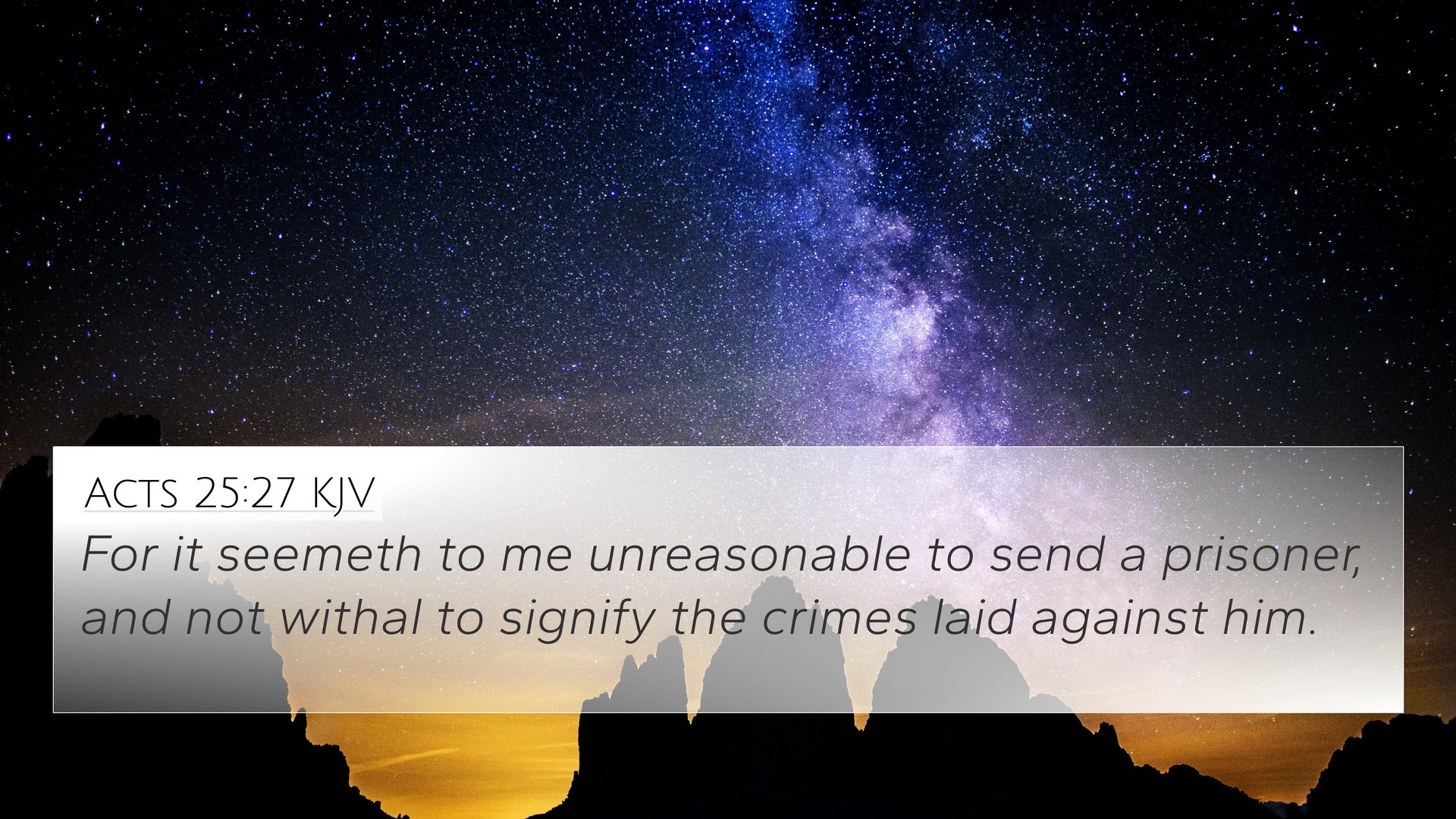Old Testament
Genesis Exodus Leviticus Numbers Deuteronomy Joshua Judges Ruth 1 Samuel 2 Samuel 1 Kings 2 Kings 1 Chronicles 2 Chronicles Ezra Nehemiah Esther Job Psalms Proverbs Ecclesiastes Song of Solomon Isaiah Jeremiah Lamentations Ezekiel Daniel Hosea Joel Amos Obadiah Jonah Micah Nahum Habakkuk Zephaniah Haggai Zechariah MalachiActs 25:27 Similar Verses
Acts 25:27 Cross References
For it seemeth to me unreasonable to send a prisoner, and not withal to signify the crimes laid against him.
Uncover the Rich Themes and Topics of This Bible Verse
Listed below are the Bible themes associated with Acts 25:27. We invite you to explore each theme to gain deeper insights into the Scriptures.
Acts 25:27 Cross Reference Verses
This section features a detailed cross-reference designed to enrich your understanding of the Scriptures. Below, you will find carefully selected verses that echo the themes and teachings related to Acts 25:27 KJV. Click on any image to explore detailed analyses of related Bible verses and uncover deeper theological insights.

Proverbs 18:13 (KJV) »
He that answereth a matter before he heareth it, it is folly and shame unto him.
Acts 25:27 Verse Analysis and Similar Verses
Understanding Acts 25:27
Acts 25:27 states, “For it seems to me unreasonable, to send a prisoner, and not to signify the crimes laid against him.” This verse captures a moment in the Apostle Paul's legal proceedings, highlighting the judicial processes in ancient times and illustrating the principles of justice.
Summary of Insights
This verse reflects both the perplexity of the Roman governor Festus regarding Paul's situation and the expectations of due process in legal matters. By indicating that it is unreasonable to send a prisoner without outlining the charges, Festus acknowledges the need for clarity and the importance of justice in governance.
Commentary Insights
Matthew Henry's Commentary
Matthew Henry emphasizes the need for a just process, suggesting that the Roman legal system required clear charges against a prisoner. He observes that Festus, having been recently appointed, was anxious to handle the situation correctly, displaying concern for the principles of justice.
Albert Barnes' Notes on the Bible
Albert Barnes points out that this verse showcases the depth of the accusations against Paul and illustrates the political nature of judicial proceedings during that era. He notes the importance of a formal accusation, reinforcing the idea that without clear charges, justice cannot be served.
Adam Clarke's Commentary
Adam Clarke provides additional context by explaining that the Roman officials sought to avoid making unjust decisions that would reflect poorly on their governance. He highlights the irony of sending Paul to the emperor without presenting the formal accusations, which underscores the theme of injustice faced by Paul during his trials.
Bible Cross References
This verse can be understood in light of several related scriptures that discuss justice and legal representation:
- Matthew 5:25: "Agree with your adversary quickly, while you are in the way with him." This emphasizes the importance of resolving disputes justly.
- John 18:29-30: "Pilate then went out unto them, and said, What accusation bring ye against this man? They answered and said unto him, If he were not a malefactor, we would not have delivered him up unto thee." This reflects the need for clear accusations.
- Acts 23:29: "And I found that he was accused of questions of their law, but to have nothing laid to his charge worthy of death or of bonds." This shows how legal proceedings should be based on legitimate charges.
- Acts 24:13: "Neither can they prove the things whereof they now accuse me." This illustrates Paul's emphasis on the lack of evidence against him.
- Romans 13:3-4: "For rulers are not a terror to good works, but to the evil...for he is the minister of God to thee for good." This presents the biblical principle of government acting in justice.
- Proverbs 18:13: "He that answereth a matter before he heareth it, it is folly and shame unto him." This emphasizes listening before judgment, relevant in a legal context.
- 1 Peter 2:13-14: "Submit yourselves to every ordinance of man for the Lord's sake: whether it be to the king, as supreme; or unto governors..." This passage affirms the necessity of obedience to lawful authority.
Thematic Bible Verse Connections
The themes within Acts 25:27 can be linked to broader narratives regarding justice and the role of officials in the New Testament. The following connections can be made:
- Justice and Righteousness: Psalms 89:14 illustrates how God's throne is established on justice and righteousness.
- Truth vs. Falsehood: John 8:32 emphasizes that knowing the truth brings freedom, aligning with Paul’s quest for justice.
- The Role of Authorities: 1 Timothy 2:1-2 encourages prayer for those in authority, signifying the importance of governance.
Conclusion
Acts 25:27 invites readers to consider the principles of justice and due process as exemplified in the trial of Paul. Through the insights of various commentators and connecting it to other scriptures, this verse serves as a pivotal point in understanding not just the historical context of Paul's trial, but also the larger biblical themes of justice, truth, and authority.
By engaging in cross-referencing such verses, readers can deepen their understanding of biblical narratives, making substantial connections about faith, governance, and morality.



